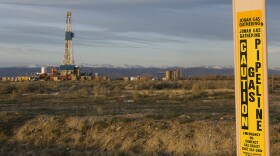A group that wants to ban hydraulic fracturing in Michigan says the state didn’t follow its own rules in disposing fluid from wells that were fracked. The group, Ban Michigan Fracking, has learned the fluid was spread on public roads close to a lake and in a campground near the Mackinac Bridge last summer.
State officials have said the fluids used to fracture deep oil and gas wells are to be disposed of carefully. Those fluids typically are millions of gallons of water per well plus a mixture of chemicals necessary to the fracking process.
Last summer, the Department of Environmental Quality allowed 40,000 gallons of fluid from fractured wells to be spread on public roads.
Paul Brady drives Sunset Trail in Kalkaska County to get to work.
He noticed it stayed muddy during a dry period last summer so he traced the wet road directly to a well site.
"We know that tons of chemicals went down that well bore. And it came up and it was spread on our roads. And that is why we should be concerned," says Brady.
When the issue was raised, the DEQ tested the water coming out of the wells and tested the roadbeds.
Hal Fitch is in charge of oil and gas development in the state.
"It turns out there really wasn’t anything in that water that was deleterious above normal oil field brine. But still…" says Fitch.
Still, the state has decided not to allow brine from fracked wells to be spread on roads to keep dust down. But it says the group trying to ban fracking altogether is overblowing the issue.
Ban Michigan Fracking says it’s been waiting for months for the DEQ test data so it can confirm the results, and it questions how the state agency "can be trusted to protect the environment when it apparently can’t follow its own rules in treating the liquid waste."




